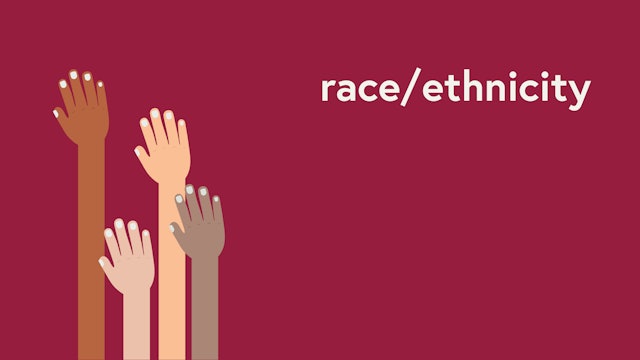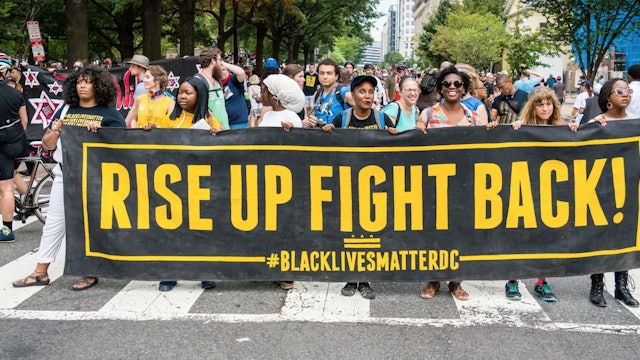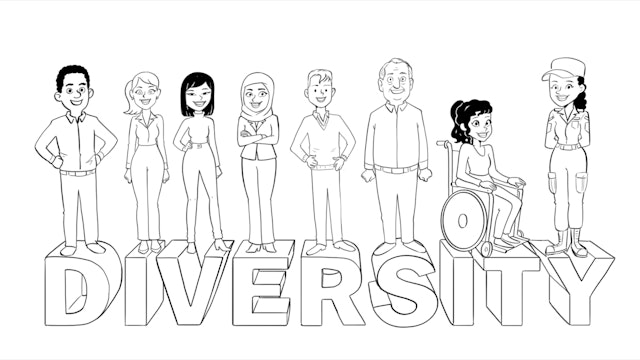-
What is the Difference Between Race and Ethnicity?
Race and ethnicity often go undifferentiated. However, these are two distinct categorizations of identity. Race typically refers to physical traits whereas ethnicity refers to cultural ones. Race is also often thought of as inherited while ethnicity is learned. Learn how race, ethnicity, and nati...
-
What are the Differences Between Nationality, Ethnicity, and Race?
Review these helpful definitions and analysis of the terms race, nationality, and ethnicity and the differences between them. Recognize why many people don’t fit neatly into or identify with a set of pre-defined categories.
-
How Do I Start a Conversation About Racial Inequity on My Team?
Conversations about racial inequities can be difficult. In this example video, we show you how to bring up the issue of racial inequity with your direct supervisor or manager. The key is to focus on your direct observations, call out the injustice, and mention the business case for doing better.
-
Does Systemic Racism Exist?
Hear evidence for how systemic racism is still a problem in today's society. And ponder about how systemic racism could be abolished using a concrete example of structural gender inclusion in the Supreme Court.
-
Inclusive Language for Race/Ethnicity
Explore 3 components of cultural identity -- race, ethnicity, and nationality -- and their differences. Learn about intersectionality and why you should never make assumptions about someone’s cultural identity. Get helpful advice for asking others respectfully, if and when the topic is relevant.
-
Should You Capitalize the W in "White?"
Learn the grammatical reasoning behind capitalizing the W in White and a brief history on the grammatical conventions of other races and ethnicities.
-
The History of Black Lives Matter
Black Lives Matter (BLM) is a social protest movement that advocates for the rights of all Black people in the face of police brutality and other forms of racial violence. It grew into a global platform for activism and reform after the 2020 murder of George Floyd.
-
How Can I Make Black Colleagues Feel Supported?
Learn effective ways to be a supportive ally to your Black co-workers. Consider the importance of educating yourself, listening, and acknowledging the ideas and contributions of Black colleagues each day, not just when racial incidents are in the headlines.
-
Latinx, Latina, Latino, and Latine
The terms Latino, Latina, Latinx, and Latine are all acceptable terms to describe people whose heritage stems from the countries of Latin America, including Central America, South America, and the Caribbean. The term Latine is considered to be the most modern and inclusive of the three.
-
Types of Diversity
Learn about several dimensions of diversity including race, ethnicity, gender identity, sexual orientation, neurodiversity, age, ability, religion, and acquired diversity.
-
What Does Hispanic Mean?
The term Hispanic is meant to be an inclusive expression to describe Spanish-speaking people all around the world. You may meet Hispanic people from Spain itself, from Latin America, and/or the Philippines.
-
Why Shouldn't I Say I'm Colorblind to Race?
Understand how saying “I’m color-blind to race” ignores societal biases and inequities that affect people of color and makes it difficult to be part of the solution or broaden our perspectives.
-
What is White Nationalism?
Confirm your understanding of the racist ideology known as White nationalism. Examine the core beliefs of White nationalists, the causes they advocate for, and the harmful impacts of White nationalism on people of color and American society as a whole.
-
What is the Racial Makeup of the U.S.?
Take a look at the United States’ racial makeup, how it has changed in recent years, and how DEI programs can respond to and reflect this increased diversity.
-
Should I Capitalize White?
Understand why capitalizing terms for race or ethnicity communicates respect, and how to use language as a tool for positive change.
-
What is the Myth of the Model Minority?
Learn the historical and cultural context of the “model minority” myth, and why it is both false and damaging.
-
Should I Say African American, Black, or People of Color (POC)?
Review a variety of terms that are used to describe people’s race and or ethnicity. Confirm which terms are accurate, appropriate, and respectful of others. Raise your awareness to avoid using terms that are inaccurate and/or offensive.
-
What is White Supremacy?
Confirm what is meant by the terms White supremacy, White privilege, and systemic racism, and the interconnections between the three. Consider how working toward inclusion and equity in the workplace helps to address race-based disparities and prejudice.
-
How Can I Make My Organization More Inclusive of Latine Employees?
Recognize that most Latine professionals feel uncomfortable being themselves at work. Discover ways to reduce this unhelpful pressure to conform. Learn how to unlock the many benefits of a Latine-inclusive workplace culture.
-
Accent & Language Biases
Accent and language bias describes our tendency to prefer those who sound like us, while judging more harshly those who speak a different language or with a different accent. This type of bias impacts hiring decisions and career advancement.
-
What Do I Call Someone Who's Black?
Understand how language has evolved over the years in reference to Black people, and learn the most respectful ways to refer to someone who’s Black.
-
What are the Different Types of Diversity?
Consider the multi-dimensional aspects of diversity (beyond race and gender alone) to gain a better perspective on the wide array of groups and intersecting identities that are represented, recognized, and respected in a truly inclusive society.
-
What is Racism?
Explore three different facets of racism -- overt, covert, and systemic -- to gain a better understanding of how racism impacts people and our society and be better prepared to address and combat it.
-
What is White Washing?
Understand how white washing misrepresents stories and histories about people of color, why this practice is harmful, and how to avoid consuming only white-washed narratives.


























